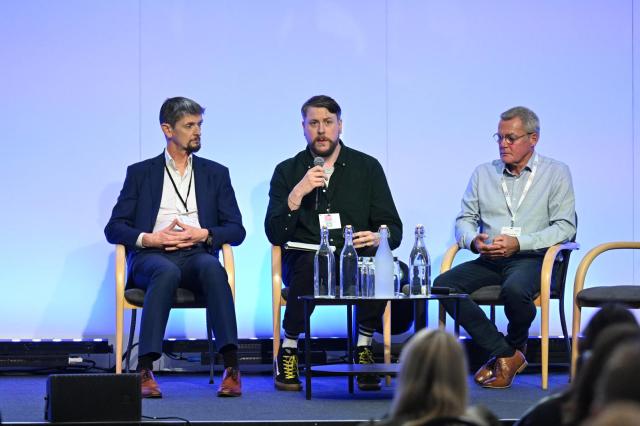
Exploring a decade of progress research has made to healthcare delivery and patient care
29 October
Thought leaders from clinical practice, academia, NHS senior leadership and the public came together at Health and Care Research Wales’ tenth annual conference to explore the difference research makes to healthcare, service delivery and patient care.
Professor Dean Harris, Consultant Colorectal Surgeon and Deputy R&D Director at Swansea Bay University Health Board joined Dr Nathan Bray, Senior Lecturer at Bangor University and Peter Hooper, a public contributor, for the session which was chaired by ITV Wales presenter Andrea Byrne.
The panel reflected on a decade of progress, examining how research has shaped healthcare, improved service delivery, and impacted on the care patients have received.
Opening the discussion, Prof Harris said that the example which crosses all specialties was the personalisation of care, which had come on “in leaps and bounds” in the last ten years.
He added: “It’s revolutionised how we treat colorectal cancer, with all of the molecular information about how we treat those cancers.
“We’ve got precise treatments for metastasis; if we fast forward ten years to where we are now based on someone’s bowel cancer having a specific genetic mutation, it means we can treat them with immunotherapy, and we’re seeing patients now where surgery just doesn’t need to be done any more for a rectal cancer - the disease just vanishes with therapy, which is astounding really and that would never have come along without one research idea and publication triggering the next one and the next one.”
Dr Bray highlighted the diagnostics as a particular area of improvement over the last decade, in areas such as cancer and dementias, adding: “From a health economists’ point of view, there are benefits to being able to detect illnesses sooner, because you can start treatment sooner and avoid the risks of complications later.
“Wales’ response to COVID-19 was also really interesting, we funded over 100 research studies but we were able to operationalise our research community and leverage our skills to create impact on policy and practice for example through the Wales COVID-19 Evidence Centre.
“That’s carried on with the Health and Care Research Wales Evidence Centre, and I think it’s really key that we continue to do primary research but also able to convert our research into impact through evidence reviews and synthesis.
“Another thing is we often focus on treatment and cure, but it’s also important that we focus on end of life too to ensure that we give people the correct care at the end of life and allow people to die with dignity as well.”
Peter added: “As a patient we see the improved treatments and wonderful new drugs and all sorts of improvements, but what we don’t see is the dotted line back from there to all of the research that’s going on, and I think that’s why the public find it a bit harder to understand the importance of research.
“They see all of these announcements in the media about a new cure for cancer as if cancer is a single thing, and then nothing for five to ten years, but actually there’s fantastic research going on all the time and this leads to all of these wonderful new treatments and discoveries.”
For the full programme, please visit the conference page.
Watch the panel below: